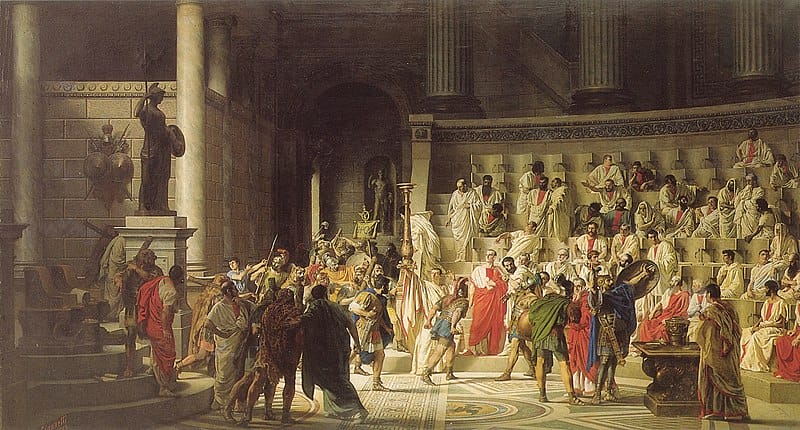Hortensia Orator was a Roman woman who lived in the first century BC. She is remembered for her powerful speech that she delivered to the Roman Senate in protest of a tax that was imposed on women. Her speech was one of the earliest recorded speeches made by a woman in history, and it has been studied and analyzed by scholars for centuries.
Hortensia was the daughter of Quintus Hortensius, a prominent Roman orator. She was born into a wealthy and influential family, and she received an education that was rare for women at the time. She was trained in rhetoric and public speaking by her father, and she became known for her eloquence and intelligence.

Source: kladcat, CC BY 2.0 https://creativecommons.org/licenses/by/2.0, via Wikimedia Commons
Hortensia’s speech was made during a time of political turmoil in Rome. The Roman Republic was in decline, and Julius Caesar had just been assassinated. The new government that was formed after Caesar’s death imposed a tax on women to pay for the war effort. Hortensia’s speech was a response to this tax, and it was a call to action for women to stand up against the government and demand their rights.
Key Takeaways
- Hortensia Orator was a Roman woman who delivered a powerful speech to the Roman Senate in protest of a tax on women.
- Hortensia was the daughter of a prominent Roman orator and was trained in rhetoric and public speaking.
- Hortensia’s speech was made during a time of political turmoil in Rome and was a call to action for women to demand their rights.
Origins of Hortensia
She was born in the early 1st century BC into a family of high social status and political influence. During her time, women in Rome were not typically allowed to participate in public affairs or speak in front of large audiences. However, Hortensia defied societal norms and became an influential public speaker, advocating for women’s rights and social justice.
She gained fame for her powerful speeches, including her defense of wealthy women who were being unfairly taxed by the Triumvirs. Her speech, which was delivered in front of the Roman Senate, is considered to be one of the earliest recorded instances of a woman speaking in public in Rome. Her legacy as a powerful orator and advocate for women’s rights has continued to inspire generations of women throughout history.
Hortensia’s Historical Context
Roman Republic Gender Dynamics
In the Roman Republic, women were not allowed to participate in politics or hold any public office. They were expected to stay at home, take care of the household, and raise children. However, there were some exceptions to this rule. Women from wealthy families had more freedom and were able to receive an education and participate in cultural events.
The Orations of Women in Ancient Rome
Despite the restrictions on women’s political participation, there were some women in ancient Rome who were able to make their voices heard. One example of this is Hortensia, a woman who delivered a powerful speech in 42 BC. In her speech, she argued against a tax that was being imposed on women.
Her speech was remarkable because it was one of the few examples of a woman speaking out in public in ancient Rome. Her oration was not only a protest against the specific tax in question but also a challenge to the gender dynamics of the Roman Republic.
Overall, her speech serves as a reminder of the limited opportunities available to women in ancient Rome but also of the courage and determination of those who were able to overcome these obstacles and make their voices heard.

Analysis of Hortensia’s Speech
Rhetorical Techniques
Hortensia’s speech was a masterful use of rhetorical techniques to make her point. She began by establishing her credibility as a speaker, stating that she was speaking on behalf of all women who were affected by the proposed tax. She then used emotional appeals to engage her audience, highlighting the injustice and unfairness of the tax and how it would impact the lives of women and their families.
She also used logical appeals to make a convincing argument. She pointed out that women were not allowed to vote or hold public office and, therefore, had no say in the decisions that were being made. She argued that it was unfair to tax them without giving them a voice in the matter. No taxation without representation, similar to the American Revolution, but almost two millenniums before.
Finally, she used repetition to drive home her point. She repeated the phrase “we women” several times throughout her speech, emphasizing the collective nature of the issue and the need for all women to stand together.
Impact on Roman Law
Hortensia’s speech had a significant impact on Roman law. Her arguments were so persuasive that the Roman Senate ultimately agreed to repeal the tax on women. This was a major victory for women’s rights in Rome, and it set a precedent for future women’s movements.
Her speech also highlighted the power of public speaking and the importance of using one’s voice to effect change. Her eloquent and passionate speech inspired others to speak out and demand their rights, and it paved the way for future activists and leaders.
Overall, Hortensia’s speech was a powerful example of the impact that rhetoric can have on society. By using a combination of emotional appeals, logical arguments, and repetition, she was able to convince the Roman Senate to change its policies and improve the lives of women in Rome.
Comparative Oratory: Hortensia vs. Contemporary Speakers
Cicero’s Influence
She was a contemporary of Cicero, who was considered one of the greatest orators of his time. Cicero’s influence can be seen in Hortensia’s speeches, as she employed similar rhetorical techniques and persuasive strategies.
Hortensia’s speeches were characterized by her use of emotional appeals, logical arguments, and vivid imagery. She often used metaphors and similes to make her points more memorable and impactful. Her speeches were also marked by her ability to connect with her audience and establish a connection with them.
Hortensia’s Legacy in Western Rhetoric
Hortensia’s powerful oratory skills and her courage to speak out against injustice have had a lasting impact on Western rhetoric. Her legacy can be seen in several ways.
Firstly, her speech inspired other women to speak out and demand their rights. Her words were a call to action and helped to galvanize women to fight for their rights. Her speech was a powerful example of how women can use rhetoric to effect change.
Secondly, Hortensia’s speech challenged the traditional view of women as passive and subservient. Her speech showed that women were capable of engaging in political discourse and could make valuable contributions to society.
Thirdly, Hortensia’s speech demonstrated the importance of using rhetoric to persuade others. Her argument was well-constructed and well-delivered, and it convinced many of her fellow citizens to support her cause.
Overall, Hortensia’s legacy in Western rhetoric is one of courage, inspiration, and persuasion. Her speech has inspired generations of women to speak out and demand their rights, and her example has shown that women have an important role to play in political discourse.

People Also Ask:
What is the historical significance of Hortensia’s oration?
Hortensia’s oration is historically significant as it represents one of the earliest recorded instances of a woman speaking out against political injustice in ancient Rome. Her speech challenged the Roman Triumvirs to reconsider their decision to impose a tax on wealthy women, arguing that these women should not be held responsible for the debts of their male relatives. Hortensia’s bold stance inspired other women to speak out against oppression and paved the way for future female leaders.
How did Hortensia’s speech impact Roman law?
Hortensia’s speech did not result in any immediate changes to Roman law, but it did spark a conversation about women’s rights and their role in society. Her words challenged the prevailing belief that women should remain silent and subservient to men. Over time, her message helped to shift attitudes towards gender equality, paving the way for future legal reforms.
What are the notable accomplishments of Hortensia as a Roman orator?
Hortensia is best known for her powerful oration on behalf of women’s rights. However, she was also a well-respected lawyer and advocate, known for her eloquence and persuasive arguments. Her speeches and legal writings were highly influential in ancient Rome and helped to shape the course of legal history.
In what context did Hortensia deliver her famous speech?
Hortensia delivered her speech in 42 BCE, during a time of political turmoil in ancient Rome. The Roman Triumvirs had recently imposed a tax on wealthy women to fund their military campaigns. Hortensia spoke out against this decision, arguing that women should not be held responsible for the debts of their male relatives.
Can you describe the main arguments presented by Hortensia in her speech to the Roman Triumvirs?
Hortensia’s speech focused on the unfairness of the tax imposed on wealthy women. She argued that women should not be held responsible for the debts of their male relatives, particularly since they had no say in how their male relatives managed their finances. She also pointed out that women had no representation in government and thus had no voice in decisions that affected their lives.
What were the consequences of Hortensia’s speech for the women of Rome?
Hortensia’s speech was a turning point for women’s rights in ancient Rome. While it did not result in any immediate changes to the law, it sparked a conversation about women’s role in society and helped to shift attitudes towards gender equality. Over time, her message inspired other women to speak out against oppression and paved the way for future legal reforms.
Hello, my name is Vladimir, and I am a part of the Roman-empire writing team.
I am a historian, and history is an integral part of my life.
To be honest, while I was in school, I didn’t like history so how did I end up studying it? Well, for that, I have to thank history-based strategy PC games. Thank you so much, Europa Universalis IV, and thank you, Medieval Total War.
Since games made me fall in love with history, I completed bachelor studies at Filozofski Fakultet Niš, a part of the University of Niš. My bachelor’s thesis was about Julis Caesar. Soon, I completed my master’s studies at the same university.
For years now, I have been working as a teacher in a local elementary school, but my passion for writing isn’t fulfilled, so I decided to pursue that ambition online. There were a few gigs, but most of them were not history-related.
Then I stumbled upon roman-empire.com, and now I am a part of something bigger. No, I am not a part of the ancient Roman Empire but of a creative writing team where I have the freedom to write about whatever I want. Yes, even about Star Wars. Stay tuned for that.
Anyway, I am better at writing about Rome than writing about me. But if you would like to contact me for any reason, you can do it at [email protected]. Except for negative reviews, of course. 😀
Kind regards,
Vladimir
